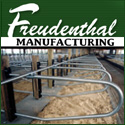 |
 |

|
|
|
Pennsylvania Ag News Headlines |
 |
USDA Announces $4.6 Million for Nanotechnology Research
Pennsylvania Ag Connection - 07/24/2017
The U.S. Department of Agriculture's (USDA) National Institute of Food and Agriculture (NIFA) announced 13 grants totaling $4.6 million for research on the next generation of agricultural technologies and systems to meet the growing demand for food, fuel,
and fiber. The grants are funded through NIFA's Agriculture and Food Research Initiative (AFRI), authorized by the 2014 Farm Bill.
"Nanotechnology is being rapidly implemented in medicine, electronics, energy, and biotechnology, and it has huge potential to enhance the agricultural sector," said NIFA Director Sonny Ramaswamy. "NIFA research investments can help spur
nanotechnology-based improvements to ensure global nutritional security and prosperity in rural communities."
The Agriculture and Food Research Initiative is America's flagship competitive grants program for foundational and translational research, education, and extension projects in the food and agricultural sciences. These grants are awarded under the AFRI
Foundational: Agriculture Systems and Technology program. Funded projects support nanotechnology-based solutions that improve food production, nutrition, sustainable agriculture, and food safety.
Fiscal year 2016 grants being announced include the University of Pennsylvania, Philadelphia, which will receive $405,055.
Among the grants, a University of Pennsylvania project will engineer cellulose nanomaterials with high toughness for potential use in building materials, automotive components, and consumer products. A University of Nevada-Las Vegas project will develop a
rapid, sensitive test to detect Salmonella typhimurium to enhance food supply safety.
Previously funded grants include an Iowa State University project in which a low-cost and disposable biosensor made out of nanoparticle graphene that can detect pesticides in soil was developed. The biosensor also has the potential for use in the biomedical,
environmental, and food safety fields. University of Minnesota (link is external) researchers created a sponge that uses nanotechnology to quickly absorb mercury, as well as bacterial and fungal microbes from polluted water. The sponge can be used on tap
water, industrial wastewater, and in lakes. It converts contaminants into nontoxic waste that can be disposed in a landfill.
Other Pennsylvania Headlines
|
|
 |


|
 |
|
Copyright © 2024 - Farms.com. All Rights Reserved. |
 |
|